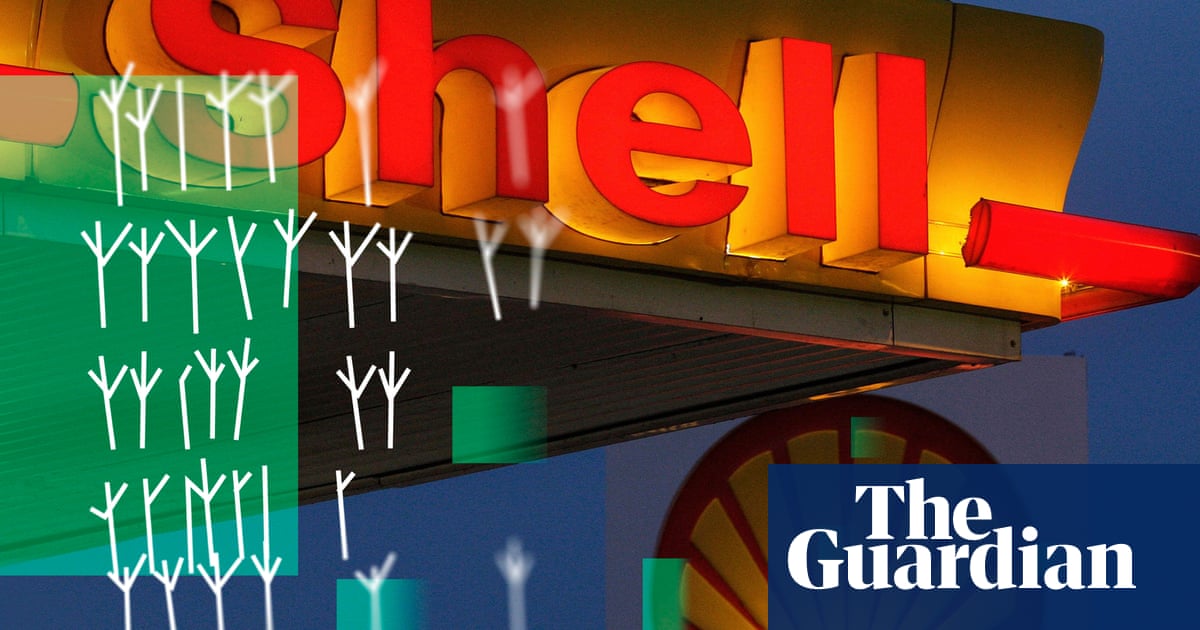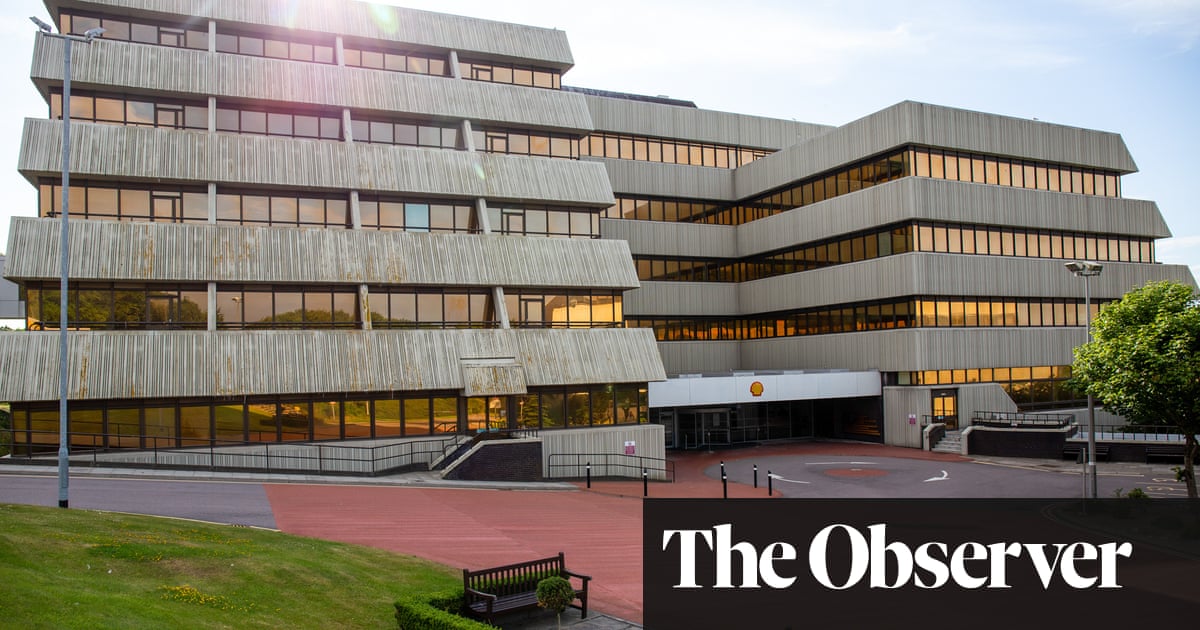
The fossil fuel firm Shell has set aside more than $450m (£367m) to invest in carbon offsetting projects, and plans to buy the equivalent of half the current market for nature offsets every year, the Guardian can reveal.
But a joint investigation by the Guardian, Die Zeit and Source Material into Verra, the world’s leading carbon standard for the rapidly growing $2bn voluntary offsets market, has found, based on analysis of a significant percentage of the projects, that more than 90% of their rainforest offset credits – among the most commonly used by companies – are likely to be “phantom credits” and do not represent genuine carbon reductions.
Shell, one of the five largest oil companies in the world, has said it plans to ramp up spending on measures to counterbalance its polluting activities in an effort to decarbonise.
Its strategy is to have a “philosophy of avoid, reduce and only then mitigate”, in theory putting nature-based carbon credits at the back of the queue in its efforts to decarbonise.
But it appears that the company has, in fact, put offsetting at the heart of its climate strategy. The scale of Shell’s plans is striking, with a target of using nature-based solutions (NBS) – its term for carbon offsetting projects – to “mitigate emissions of around 120m metric tonnes of CO2 equivalent (MtCO2e) per year by 2030”. That figure is roughly half the size of the current entire annual market for nature offsets, which is about 227.7m MtC02e.
Shell has set targets to reduce its scope 1 and 2 emissions by at least 27m tonnes, from 68m in 2021 to 41m in 2030, through a number of strategies including the use of renewable power and improvements in efficiency. The company expects NBS to account for between 2m and 7m tonnes of this reduction, underlining its importance to Shell’s decarbonisation plans.
In 2020, Shell invested about $90m in nature-based projects and bought an Australian company that works on developing and monitoring carbon sequestration projects. The following year, Shell announced ambitions to invest about $100m a year in nature-based projects, although it said these plans were being slowed by the Covid-19 outbreak. That year, it allocated more than $480m to various projects – more than $456m of it for NBS projects – to be deployed across the length of the contracts.
The company has also referred to offsetting as part of its carbon-reduction strategy in its appeal against the landmark judgment by a Dutch court last year that Shell must reduce its emissions by 45% by 2030.
And it has been intimately involved in the creation of the carbon market, with staff sitting in key advisory posts. At least three Shell staff sit on advisory groups for Verra, a US non-profit that operates the world’s leading carbon standard.
Verra’s former director of programmes is a carbon offsetting manager at Shell, while the oil major’s former head of nature-based solutions has just co-founded a new carbon credits rating agency that helps companies find supposedly high-quality credits with a Verra advisory group member.
Global carbon offsetting markets have grown rapidly, with many companies turning to them as part of their net zero plans and emphasising the benefits they can offer. Mark Carney, the ex-governor of the Bank of England, headed a plan to make offsets work, describing them as a way of helping companies get to net zero and “an incredibly important market”, although cautioning that they could not be “a silver bullet that removes responsibility from anyone for reducing absolute emissions”.
But there have also been significant concerns raised about whether all offsets really work. The Guardian investigation analysed the findings of three scientific studies that used satellite images to check the results of a number of forest offsetting projects, known as Redd+ schemes, and found that, based on the results of two of the studies, about 94% of the credits the projects produced should not have been approved.
Verra strongly disputes the findings and argues that the methodology used by the scientists means that the results are incorrect. They also point out that their work since 2009 has allowed billions of dollars to be channelled to the vital work of preserving forests.
A Shell spokesperson told the Guardian: “As part of our efforts to become a net-zero energy business by 2050, we are investing billions of dollars in lower-carbon energy, including investments in low-carbon fuels, renewable power and hydrogen.
“Where we use carbon credits, it is in line with our philosophy of avoid, reduce and only then mitigate emissions. They can help protect or restore natural ecosystems, and offer a near-term solution for addressing emissions that cannot be immediately abated. The carbon credits Shell uses and invests in are independently verified by third parties. We are working in collaboration with government, business and civil society to help strengthen the integrity and effectiveness of the carbon market.”
The findings of the investigation will raise serious questions for Shell, and for many corporations that are counting on rainforest-based carbon offsets as part of their plan for reducing their emissions. As businesses race to declare their plans for reaching net zero, carbon offsets have been a critical part of their plans, and the market has grown exponentially.
Lavazza, for example, says its coffee pods are carbon neutral using one project in Peru that stopped no deforestation, according to the analysis. Leon used the same scheme to claim its burgers were carbon neutral; the housebuilder Berkeley Group used it to say it was the UK’s first carbon-positive builder; and easyJet used it for carbon-neutral flying until changing its policy.
Gucci, BHP, Salesforce.com and Pearl Jam all used offsets from another Peruvian scheme that only avoided around a 10th of the emissions it was claimed, according to the analysis. Disney used credits from a Cambodian scheme that was about nine times less effective than claimed.
Boeing bought credits from a Colombian project estimated to stop no deforestation for its net-zero manufacturing claim, according to the studies, and smaller companies have also bought the offsets, including a UK tipi rental company and a financial services firm.
When asked to comment Gucci, Pearl Jam, BHP, Berkeley Groupand Salesforce did not comment, while Lavazza said it bought credits that were certified by Verra, “a world’s leading certification organisation”, as part of the coffee products company’s “serious, concrete and diligent commitment to reduce” its carbon footprint. It plans to look more closely into the project.
The fast food chain Leon no longer buys carbon offsets from one of the projects in the studies, as part of its mission to maximise its positive impact. EasyJet has moved away from carbon offsetting to focus its net zero work on projects such as “funding for the development of new zero-carbon emission aircraft technology”. And Boeing said that although it does buy offsets its reduction strategy is focussed on conserving energy resources and increasing the use of renewals, so that the number of offsets it buys fell by nearly 19% between 2020 and 2021.
Thomas Crowther, professor of ecology at ETH Zürich and co-chair of the United Nations Decade on Ecosystem Restoration who reviewed the findings of the investigation, told the Guardian: “Limiting deforestation is absolutely essential for achieving our climate and biodiversity targets. But transparency remains a key challenge, and it is critical that we use the best available scientific approaches to ensure the accountability of environmental commitments at scale”
“Companies and citizens need to be able to support projects they can trust. We need to urgently create a system where this is a reality.”












